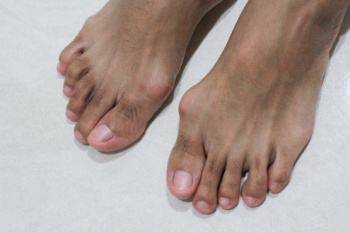
A bunion, or hallux valgus, occurs when the base joint of the big toe shifts outward, causing the tip of the toe to lean toward the smaller toes. While the exact cause is not fully understood, factors like wearing poorly fitting footwear, a family history of bunions, and joint conditions such as osteoarthritis or rheumatoid arthritis can contribute to their development. Symptoms of bunions include pain, stiffness, and swelling at the big toe joint, which can make walking and finding comfortable shoes difficult. Bunions usually worsen over time, making early treatment important. A podiatrist can evaluate the severity of the bunion and recommend appropriate footwear, prescribe custom orthotics or discuss surgical solutions. These treatments can help alleviate pain, improve foot function, and prevent the condition from worsening. If you have a bunion that is interfering with your daily activities, it is suggested that you schedule an appointment with a podiatrist for an exam and treatment options.
If you are suffering from bunions, contact Dr. John P. Beaupied of Palos Podiatry. Our doctor can provide the care you need to keep you pain-free and on your feet.
What Is a Bunion?
A bunion is formed of swollen tissue or an enlargement of boney growth, usually located at the base joint of the toe that connects to the foot. The swelling occurs due to the bones in the big toe shifting inward, which impacts the other toes of the foot. This causes the area around the base of the big toe to become inflamed and painful.
Why Do Bunions Form?
Genetics – Susceptibility to bunions are often hereditary
Stress on the feet – Poorly fitted and uncomfortable footwear that places stress on feet, such as heels, can worsen existing bunions
How Are Bunions Diagnosed?
Doctors often perform two tests – blood tests and x-rays – when trying to diagnose bunions, especially in the early stages of development. Blood tests help determine if the foot pain is being caused by something else, such as arthritis, while x-rays provide a clear picture of your bone structure to your doctor.
How Are Bunions Treated?
- Refrain from wearing heels or similar shoes that cause discomfort
- Select wider shoes that can provide more comfort and reduce pain
- Anti-inflammatory and pain management drugs
- Orthotics or foot inserts
- Surgery
If you have any questions, please feel free to contact our office located in Palos Heights, IL . We offer the newest diagnostic and treatment technologies for all your foot care needs.



